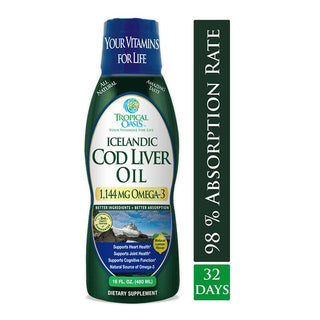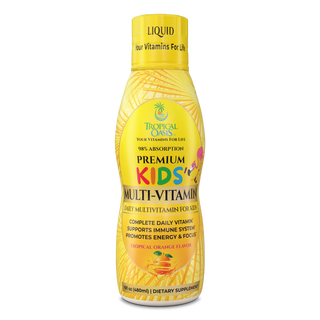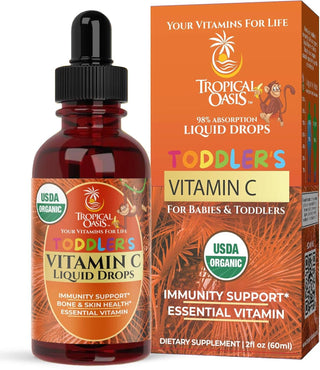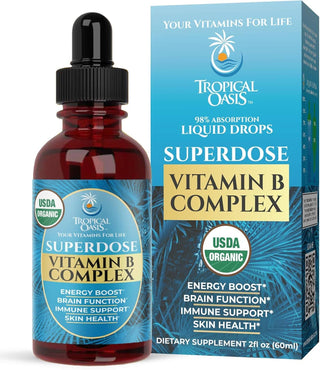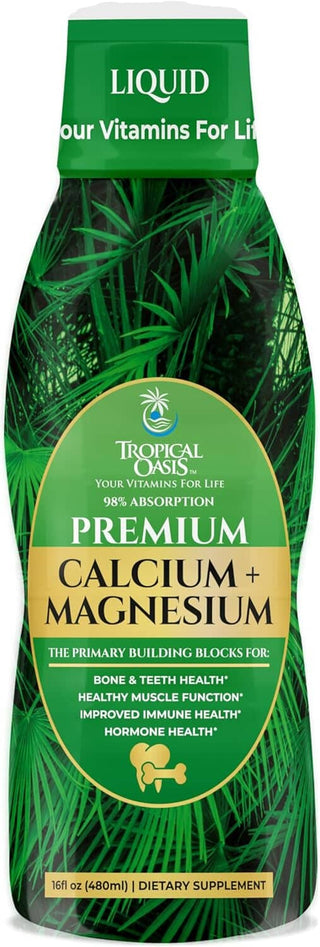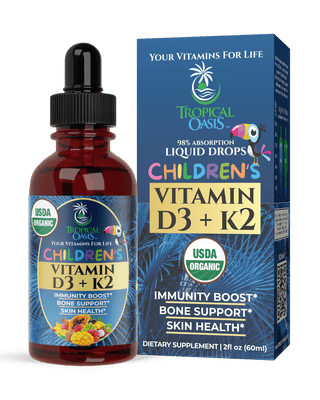Infant Liquid Vitamins
At Tropical Oasis, we understand the importance of infant liquid vitamins in supporting your baby’s healthy growth and development. That’s why we offer premium liquid supplements designed to deliver key vitamins and minerals in a form that’s easy for babies to absorb. Our dedication to quality and innovation has made us a trusted name in liquid supplements for individuals of all ages, including the youngest members of your family.
You’re viewing 1-6 of 6 products
Key Takeaways:
- Tailored Nutrition: Infant liquid vitamins help fill nutritional gaps for breastfed or formula-fed babies, ensuring proper growth and development.
- Key Nutrients: They typically include essential vitamins like A, D, C, and iron to support immunity, bone health, and cognitive development.
- Ease of Administration: Liquid vitamins are convenient, easy to mix with food or milk, and designed specifically for infants’ needs.
What Are Infant Liquid Vitamins?
Infant liquid vitamins are nutritional supplements designed specifically for babies, typically in a liquid form, to make administration easier. These vitamins cater to the unique dietary needs of infants who may not receive adequate nutrition from breast milk, formula, or solid foods. Pediatricians often recommend liquid vitamins for infants with specific deficiencies or those who need additional nutrients to support healthy growth and development.
Their liquid format ensures better absorption, ease of mixing with food or drinks, and is ideal for infants who are not yet capable of swallowing pills or capsules.
Boost Your Toddler's Immunity With The Best Vitamin C Drops
Give your little one the ultimate immune system support with Tropical Oasis Organic Toddler Vitamin C Drops—a premium, organic supplement crafted for growing toddlers. Made from acerola fruit extract, which boasts one of the highest natural sources of Vitamin C, these drops deliver superior nourishment compared to traditional citrus-based supplements.
Designed with parents and kids in mind, the liquid formula ensures easy administration and rapid absorption, making it a hassle-free way to help your child stay healthy and strong. Plus, the gentle organic ingredients ensure it's safe and suitable for young, sensitive systems.
Why settle for less when you can give your toddler the best? With Tropical Oasis Organic Toddler Vitamin C Drops, you're not just supporting immunity—you’re ensuring your child gets the high-quality, plant-based nutrition they deserve.
Why Are Infant Liquid Vitamins Important?
Infant liquid vitamins play a crucial role in supporting a baby’s growth and overall health, especially during the early months when rapid development occurs. They help in multiple ways:
Fill Nutritional Gaps
While breast milk or formula provides most essential nutrients, some vitamins like Vitamin D and iron may not be present in adequate amounts, depending on the infant’s diet. Supplementing with liquid vitamins ensures babies receive these crucial nutrients for optimal health and development.
Support Development
Nutrients like Vitamin A contribute to healthy eyesight and skin, while Vitamin D helps in the absorption of calcium, promoting strong bones and teeth. B vitamins are integral for the nervous system and brain development, ensuring proper cognitive and neurological growth during these formative months.
Boost Immunity
Vitamins C and E act as antioxidants, protecting cells from damage and fortifying the immune system. These nutrients help infants combat infections and recover more quickly from common illnesses like colds.
Prevent Deficiencies
Lack of essential nutrients can lead to serious health issues, such as rickets caused by Vitamin D deficiency or anemia resulting from low iron levels. By providing these nutrients in liquid form, deficiencies can be effectively prevented, ensuring the baby grows up healthy and strong.

When To Use Infant Liquid Vitamins
Infant liquid vitamins are not always necessary for every baby, as many receive adequate nutrition from breast milk or formula. However, there are specific situations where supplementation may be essential to ensure optimal growth and health.
Breastfed Babies
Exclusively breastfed infants may require Vitamin D supplementation because breast milk naturally contains low levels of this vital nutrient. Pediatricians often recommend liquid Vitamin D drops to support bone health and prevent conditions like rickets in breastfed babies.
Formula-Fed Babies
Although most infant formulas are fortified with essential vitamins, babies consuming less than 32 ounces of formula daily might need more than 32 ounces of formula daily to meet their nutritional needs. Supplementing with liquid vitamins ensures these infants receive adequate amounts of critical nutrients like Vitamin D and iron.
Premature Or Low Birth Weight Babies
Premature and low birth weight infants have unique nutritional needs because their development was interrupted before full-term gestation. Liquid vitamins can help these babies catch up on growth by providing essential nutrients that might otherwise be deficient.
Babies With Dietary Restrictions
Infants on specialized diets, such as those with food allergies or intolerances, may miss out on key nutrients found in common foods or formulas. Liquid vitamins can address these gaps, ensuring the baby receives a balanced intake of essential vitamins and minerals.
Under Pediatric Guidance
A pediatrician may prescribe liquid vitamins to safely and effectively resolve these issues in cases of diagnosed deficiencies, such as low iron, leading to anemia or inadequate Vitamin C levels. Close monitoring ensures the correct dosage and prevents over-supplementation.
Key Nutrients Found In Infant Liquid Vitamins
Infant liquid vitamins typically contain a blend of essential nutrients tailored to support a baby’s growth and development. These nutrients are carefully chosen to meet the specific needs of infants, ensuring proper growth during critical stages of development.
- Vitamin A: This nutrient plays a crucial role in maintaining healthy vision by supporting the development of the retina and preventing night blindness. Additionally, it strengthens the immune system and promotes healthy skin, acting as the first line of defense against infections.
- Vitamin D: Known as the "sunshine vitamin," Vitamin D aids in calcium absorption, which is essential for building strong bones and teeth. It is also vital for proper muscle function and helps prevent rickets, a condition characterized by soft or weak bones.
- Vitamin C: A powerful antioxidant, Vitamin C helps protect cells from damage and supports the immune system, making infants more resilient to common illnesses. It also enhances the absorption of iron from food, preventing iron deficiency anemia.
- B Vitamins (B1, B2, B6, and B12): These vitamins are essential for converting food into energy, ensuring that infants have the energy needed for growth and activity. They also play a critical role in brain development, red blood cell production, and maintaining a healthy nervous system.
- Iron: Iron is a key component of hemoglobin, the protein in red blood cells that carries oxygen throughout the body. Adequate iron levels help prevent anemia, which can lead to fatigue, poor appetite, and developmental delays in infants.
- Calcium: Calcium is indispensable for the development of strong bones and teeth, forming the structural foundation of a growing baby’s skeleton. It also supports proper nerve function and muscle contractions, including the heart muscle.
- Zinc: Zinc contributes to immune function, helping infants fight infections and heal wounds efficiently. It is also involved in cell growth and repair, playing a role in the development of tissues and organs.
Many infant liquid vitamins are formulated to exclude artificial additives, making them gentle on a baby’s sensitive digestive system. This ensures that supplementation is both safe and effective, promoting overall well-being without unnecessary complications.
Tips For Administering Liquid Vitamins To Infants
Giving liquid vitamins to infants can be a smooth process with the right approach. Here are some helpful tips to ensure the experience is simple and stress-free for both you and your baby:
Use the Provided Dropper
Most infant liquid vitamins come with a calibrated dropper to ensure you deliver the exact dosage the pediatrician recommends. Proper measurement is essential to avoid under- or over-supplementation, which could affect your baby’s health.
Mix With Food Or Drink
If your baby dislikes the taste of liquid vitamins, mix the dose with breast milk, formula, or a small amount of pureed food to mask the flavor. This can make administering vitamins easier and more enjoyable for your baby without compromising their effectiveness.
Administer Slowly
When giving vitamins directly, position the dropper to the side of the baby’s mouth and release the liquid gradually. This technique minimizes the risk of choking, gagging, or the baby spitting out the vitamins, ensuring the baby gets the full dose.
Time It Right
Pick a time when your baby is calm, such as during a feeding session or shortly after a nap, when they are more likely to cooperate. Avoid administering vitamins when your baby is fussy or tired, as it may make the process more difficult.
Store Properly
Follow the storage instructions on the label, as some vitamins need refrigeration to retain their potency. Keeping them in the correct environment ensures that the nutrients remain effective and safe for your baby.
Be Consistent
Administer the vitamins at the same time each day to establish a routine and help you remember the dosage schedule. Consistency also helps ensure your baby receives their daily nutrients regularly, contributing to optimal growth and development.
Read also:
- Cod Liver Oil Benefits For Kids: Growth And Development
- Liquid Multivitamin For Kids: Choosing the Best One
- Liquid Vitamins for Kids: What to Look For
Sources:
- Curtis, D. M. (1990). Infant nutrient supplementation. The Journal of Pediatrics, 117(2), S110–S118. https://doi.org/10.1016/s0022-3476(05)80007-1
- Zhao, X., Bridgman, S. L., Drall, K. M., Tun, H. M., Mandhane, P. J., Moraes, T. J., Simons, E., Turvey, S. E., Subbarao, P., Scott, J. A., & Kozyrskyj, A. L. (2023). Infant Vitamin D Supplements, Fecal Microbiota and Their Metabolites at 3 Months of Age in the CHILD Study Cohort. Biomolecules, 13(2), 200. https://doi.org/10.3390/biom13020200
- Silva, M. A., Albuquerque, T. G., Oliveira, M. B. P. P., & Costa, H. S. (2018). Vitamin C evaluation in foods for infants and young children by a rapid and accurate analytical method. Food Chemistry, 267, 83–90. https://doi.org/10.1016/j.foodchem.2017.11.046
- Darlow, B. A. (2005). Vitamin C supplementation in very preterm infants: a randomised controlled trial. Archives of Disease in Childhood - Fetal and Neonatal Edition, 90(2), F117–F122. https://doi.org/10.1136/adc.2004.056440
Frequently Asked Questions
Infant liquid vitamins are better suited for babies because they cannot chew solid forms, and liquid vitamins are easier to administer and absorb.
Some liquid vitamins may contain allergens like dairy or soy. Always check the label and consult your pediatrician if your child has allergies.
Many require refrigeration and have a shorter shelf life due to the absence of preservatives. Always check the expiration date and storage instructions.
While some are available over the counter, it’s crucial to consult a pediatrician to avoid over-supplementing your baby.
Depending on their needs, liquid vitamins can often be introduced from birth under a doctor’s guidance, especially for Vitamin D supplementation in breastfed infants.
Yes, many brands offer organic and natural liquid vitamins free from synthetic additives. Look for certifications to ensure authenticity.

